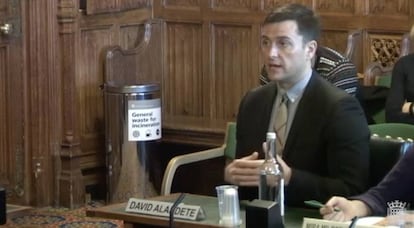British parliament inquiry addresses Russian meddling in Catalonia
A committee investigating fake news will hear testimony in the week of the Catalan elections

A British parliamentary committee investigating fake news will hear testimony on Tuesday morning regarding alleged Russian influence in the Catalan independence referendum of October 1.
The Digital, Culture, Media and Sport Committee is holding the first public session of an inquiry that began during the previous political term and was relaunched in September, following the UK elections.
The committee will also hear evidence from experts on artificial intelligence and algorithms
The goal of the inquiry is to analyze fake news, the boundaries between these and “biased but legitimate commentary,” and their “impact on public understanding of the world, and also on the public response to traditional journalism,” according to the committee’s mission statement.
Part of that inquiry focuses on allegations of Russian meddling in several Western democracies.
“We are investigating the role of Russian agencies in the dissemination of disinformation in the United States, in the British Brexit campaign and in other countries,” said Damian Collins, the conservative MP who chairs the committee.
“One of the topics is the Catalan referendum, and the role of agencies from Russia and Venezuela,” he added. “We have received evidence of cases in several countries, and also on the issue of Catalonia. What we aim to do is expose the way fake news are used as a weapon by foreign agencies in election processes.”
What we aim to do is expose the way fake news are used as a weapon by foreign agencies in election processes
Damian Collins, committee chair
As Catalan elections are taking place this week, the committee wants to explore evidence of any eventual interference there, said Collins.
The second panel of experts scheduled to speak at the evidence session on Tuesday includes David Alandete, managing editor at EL PAÍS; Francisco de Borja Lasheras, director of the Madrid office of the European Council on Foreign Relations think tank, and Mira Milosevich-Juaristi, associate professor of history of international relations at the IE Business School in Madrid.
The dissemination of fake news by Russia as a way to undermine electoral processes in the US and European Union has already been the target of several investigations. A detailed analysis of pro-Russian websites and social media users conducted by EL PAÍS in recent months also turned up evidence of meddling in the Catalan independence push, a conflict with very high potential for inflicting damage on the EU.
The session on Tuesday will also include evidence from experts on artificial intelligence and algorithms and how these can be used both to spread fake news as well as to fight them.
Later sessions will address the role of technology companies, and ways of educating consumers of online information. A final report is expected around Easter, when parliament will hear the committee’s conclusions.
English version by Susana Urra.
Tu suscripción se está usando en otro dispositivo
¿Quieres añadir otro usuario a tu suscripción?
Si continúas leyendo en este dispositivo, no se podrá leer en el otro.
FlechaTu suscripción se está usando en otro dispositivo y solo puedes acceder a EL PAÍS desde un dispositivo a la vez.
Si quieres compartir tu cuenta, cambia tu suscripción a la modalidad Premium, así podrás añadir otro usuario. Cada uno accederá con su propia cuenta de email, lo que os permitirá personalizar vuestra experiencia en EL PAÍS.
¿Tienes una suscripción de empresa? Accede aquí para contratar más cuentas.
En el caso de no saber quién está usando tu cuenta, te recomendamos cambiar tu contraseña aquí.
Si decides continuar compartiendo tu cuenta, este mensaje se mostrará en tu dispositivo y en el de la otra persona que está usando tu cuenta de forma indefinida, afectando a tu experiencia de lectura. Puedes consultar aquí los términos y condiciones de la suscripción digital.









































